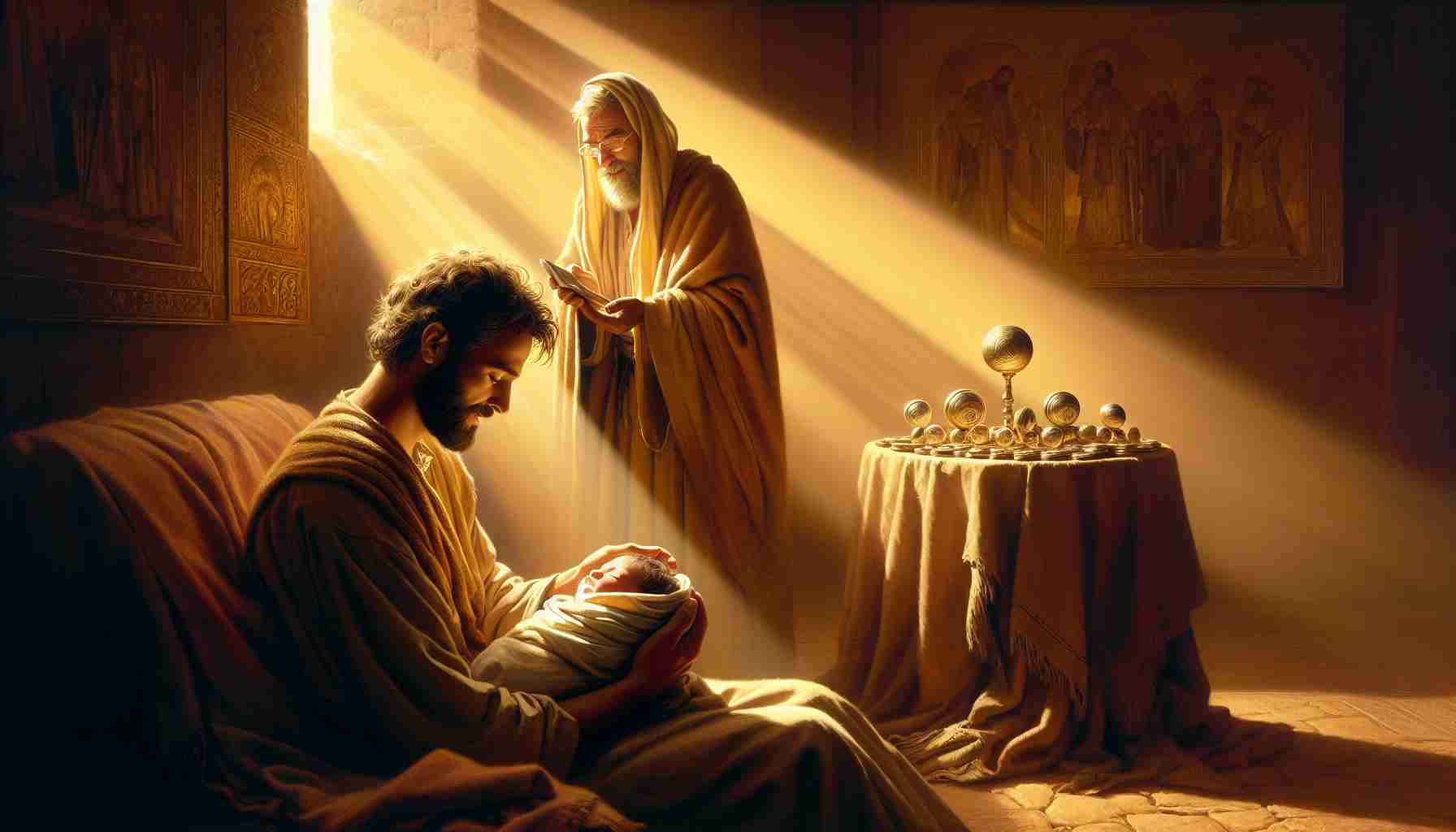

I still remember the weight of the silver coins in my palm, though so many years have passed. That morning, the coins had glinted in the sunlight like tiny mirrors, yet they felt heavier than their size. I was only twenty, freshly married, still unsure in my role as a husband, let alone as a father. Our firstborn son lay bundled in a woven basket beside our fire, his tiny face barely visible beneath the linen cloth.
My name is Dov. I lived just outside Jerusalem, near the road that leads to Bethlehem. You won’t find my name in any scroll, but I stood there the day I brought my son—my firstborn—to our local kohen, the priest devoted to serving in G-d’s holy house.
He was a quiet man, maybe fifty, white beard, eyes that looked deeper than a man’s soul. He greeted me with a nod as I approached.
“You have come for Pidyon HaBen?” he asked. That’s Hebrew for “Redemption of the Firstborn.” Every Israelite family must redeem their firstborn son by giving five silver shekels to a kohen. It honors what happened in Egypt—when G-d spared the firstborn of Israel and took them as his own. But later, G-d gave the Levites to serve in their place, and told us to redeem our sons instead.
“Yes,” I said. My voice trembled; I hadn’t expected it would feel so holy.
He held out his hand, and I hesitated. I looked down at my son, Yair. His soft breaths rose and fell beneath his blanket. Did this act mean I was giving him away? Was I handing him, even symbolically, to a life of service I didn’t choose for him?
The kohen must have sensed my heart shifting. “The coins do not take your son from you,” he said gently. “They remind you that he belongs to G-d first. What you do with him, the life you shape for him—do it with that truth in your hands.”
I placed the coins in his palm.
He recited the blessings aloud, ancient words passed down since the time of Moses. I repeated what was asked, each word settling inside my chest like stones across a river—forming a path I had not known was there.
After the ceremony, we sat in silence. Then I asked, “Did it change how you raised your sons, knowing they belonged to G-d first?”
He smiled. “It changed how I walked with them. I taught them Torah as though it was breath. I forgave quicker. Prayed more. Watched them not only grow into men, but grow toward G-d.”
That night I looked at Yair differently. Not less mine—but more of something sacred. Entrusted, not owned.
From then on, every choice I made for him carried that echo of redemption. The coins had passed from one hand to another, but the weight of the moment stayed with me.
And as Yair grew, so did I—learning not to hold him back, but to help him rise.
I still remember the weight of the silver coins in my palm, though so many years have passed. That morning, the coins had glinted in the sunlight like tiny mirrors, yet they felt heavier than their size. I was only twenty, freshly married, still unsure in my role as a husband, let alone as a father. Our firstborn son lay bundled in a woven basket beside our fire, his tiny face barely visible beneath the linen cloth.
My name is Dov. I lived just outside Jerusalem, near the road that leads to Bethlehem. You won’t find my name in any scroll, but I stood there the day I brought my son—my firstborn—to our local kohen, the priest devoted to serving in G-d’s holy house.
He was a quiet man, maybe fifty, white beard, eyes that looked deeper than a man’s soul. He greeted me with a nod as I approached.
“You have come for Pidyon HaBen?” he asked. That’s Hebrew for “Redemption of the Firstborn.” Every Israelite family must redeem their firstborn son by giving five silver shekels to a kohen. It honors what happened in Egypt—when G-d spared the firstborn of Israel and took them as his own. But later, G-d gave the Levites to serve in their place, and told us to redeem our sons instead.
“Yes,” I said. My voice trembled; I hadn’t expected it would feel so holy.
He held out his hand, and I hesitated. I looked down at my son, Yair. His soft breaths rose and fell beneath his blanket. Did this act mean I was giving him away? Was I handing him, even symbolically, to a life of service I didn’t choose for him?
The kohen must have sensed my heart shifting. “The coins do not take your son from you,” he said gently. “They remind you that he belongs to G-d first. What you do with him, the life you shape for him—do it with that truth in your hands.”
I placed the coins in his palm.
He recited the blessings aloud, ancient words passed down since the time of Moses. I repeated what was asked, each word settling inside my chest like stones across a river—forming a path I had not known was there.
After the ceremony, we sat in silence. Then I asked, “Did it change how you raised your sons, knowing they belonged to G-d first?”
He smiled. “It changed how I walked with them. I taught them Torah as though it was breath. I forgave quicker. Prayed more. Watched them not only grow into men, but grow toward G-d.”
That night I looked at Yair differently. Not less mine—but more of something sacred. Entrusted, not owned.
From then on, every choice I made for him carried that echo of redemption. The coins had passed from one hand to another, but the weight of the moment stayed with me.
And as Yair grew, so did I—learning not to hold him back, but to help him rise.